
Jet Propulsion Laboratory (JPL) is a federally funded research and development center in the City of Pasadena, California, United States. Founded in 1936 by Caltech researchers, the laboratory is now owned and sponsored by the National Aeronautics and Space Administration (NASA) and administrated and managed by the California Institute of Technology.
The Long March rockets are a family of expendable launch system rockets operated by the China Aerospace Science and Technology Corporation. The rockets are named after the Chinese Red Army's 1934–35 Long March military retreat during the Chinese Civil War.
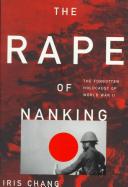
The Rape of Nanking: The Forgotten Holocaust of World War II is a bestselling 1997 non-fiction book written by Iris Chang about the 1937–1938 Nanjing Massacre — the mass murder and mass rape of Chinese civilians committed by the Imperial Japanese Army in Nanjing, the capital of the Republic of China, immediately after the Battle of Nanjing during the Second Sino-Japanese War. It describes the events leading up to the Nanjing Massacre, provides a graphic detail of the war crimes and atrocities committed by Japanese troops, and lambastes the Japanese government for its refusal to rectify the atrocities. It also criticizes the Japanese people for their ignorance about the massacre. It is one of the first major English-language books to introduce the Nanjing Massacre to Western and Eastern readers alike, and has been translated into several languages. The book significantly renewed public interest in Japanese wartime conduct in China, Korea, the Philippines, Southeast Asia, and the Pacific.
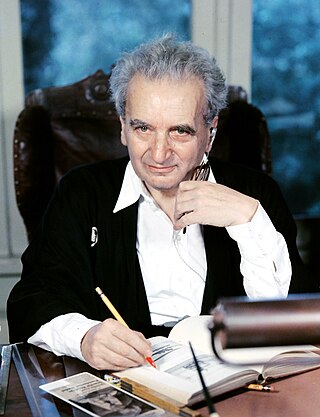
Theodore von Kármán, was a Hungarian-American mathematician, aerospace engineer, and physicist who worked in aeronautics and astronautics. He was responsible for crucial advances in aerodynamics characterizing supersonic and hypersonic airflow. The human-defined threshold of outer space is named the "Kármán line" in recognition of his work. Kármán is regarded as an outstanding aerodynamic theoretician of the 20th century.

Qian Xuesen, or Hsue-shen Tsien, was a Chinese aerospace engineer and cyberneticist who made significant contributions to the field of aerodynamics and established engineering cybernetics.

Iris Shun-Ru Chang was an American journalist, author of historical books and political activist. She is best known for her best-selling 1997 account of the Nanking Massacre, The Rape of Nanking, and in 2003, The Chinese in America: A Narrative History. Chang is the subject of the 2007 biography Finding Iris Chang, and the 2007 documentary film Iris Chang: The Rape of Nanking starring Olivia Cheng as Iris Chang. The independent 2007 documentary film Nanking was based on her work and dedicated to her memory.

Frank Joseph Malina was an American aeronautical engineer and painter, known for his pioneering work in early rocketry.

Apollo Milton Olin Smith was an important figure in the aerodynamics field at Douglas Aircraft from 1938 to 1975 and an early pioneer in the area of computational fluid dynamics.
Grant B. Cooper, was the chief defense attorney in the murder trial against Sirhan Sirhan for the assassination of Robert F. Kennedy. Sirhan's more recent counsel has accused Cooper of deliberately throwing the Sirhan case as the result of a then-pending indictment against Cooper for possessing stolen transcripts of the grand jury proceedings in the Beverly Hills Friar's Club card cheating case. Cooper, who faced the possibility of jail time, was eventually fined $1000. Cooper died in 1990 of an aortic aneurysm.

The Guggenheim Aeronautical Laboratory at the California Institute of Technology (GALCIT), was a research institute created in 1926, at first specializing in aeronautics research. In 1930, Hungarian scientist Theodore von Kármán accepted the directorship of the lab and emigrated to the United States. Under his leadership, work on rockets began there in 1936. GALCIT was the first—and from 1936 to 1940 the only—university-based rocket research center. Based on GALCIT's JATO project at the time, the Jet Propulsion Laboratory was established under a contract with the United States Army in November 1943.
Private was an experimental rocket developed by the California Institute of Technology on behalf of the United States Army. Tested in two different configurations, it provided the proof of concept that a fin-stabilised ballistic missile was technologically feasible, and led to the development of the Corporal ballistic missile. The Private was the first in a series of JPL rocket designs for the US Army, whose names correspond to the progression in Army enlisted ranks, leading to WAC Corporal, Corporal E, MGM-5 Corporal and finally Sergeant.
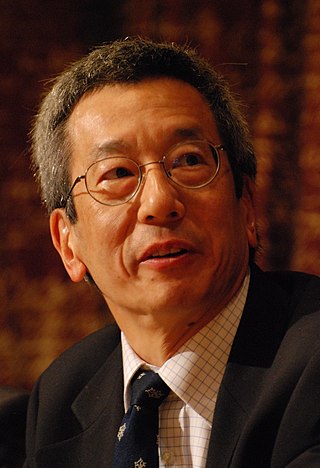
Roger Yonchien Tsien was an American biochemist. He was a professor of chemistry and biochemistry at the University of California, San Diego and was awarded the Nobel Prize in Chemistry in 2008 for his discovery and development of the green fluorescent protein, in collaboration with organic chemist Osamu Shimomura and neurobiologist Martin Chalfie. Tsien was also a pioneer of calcium imaging.
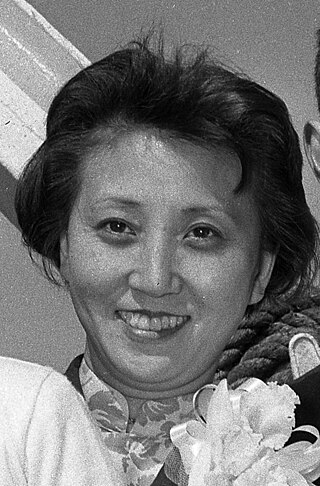
Jiang Ying was a Chinese opera singer and music teacher. She was the wife of Chinese rocket scientist Qian Xuesen, to whom she was married from 1947 until 2009.

Qian, also spelt Chin, Chien, Tsien, or Zee in Wu Chinese, is a common Chinese family name. The name literally means "money". Qian is listed at the second place in the Song Dynasty text Hundred Family Surnames, in the line 趙錢孫李. As the royal surname of the kingdom of Wuyue, Qian was regarded as second only to Zhao, the imperial surname of the Song. As of 2008, Qian is the 96th most common surname in China, shared by 2.2 million people, with the province with the most people sharing the name being Jiangsu, an area formerly within the Wuyue kingdom.
Hu Haichang was a Chinese mechanical and aerospace engineer. He was in charge of the early phase development for the Dong Fang Hong I, China's first artificial satellite. Hu was an academician of the Chinese Academy of Sciences.
Hsue-Chu Tsien, COL, was a Chinese-born American aeronautical and mechanical engineer who played important roles in aircraft building in both China and afterward the United States.
The Wu Chinese people, also known as Wuyue people, Jiang-Zhe people (江浙民系) or San Kiang (三江), are a major subgroup of the Han Chinese. They are a Wu Chinese-speaking people who hail from Southern Jiangsu Province, the entirety of the city of Shanghai and all of Zhejiang Province, as well as smaller populations in Xuancheng prefecture-level city in Southern Anhui Province, Shangrao, Guangfeng and Yushan counties of Northeastern Jiangxi Province and some parts of Pucheng County in Northern Fujian Province.
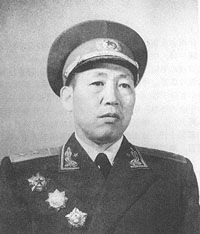
Wang Bingzhang was a Chinese Communist revolutionary and a founding lieutenant general of the People's Liberation Army (PLA). He joined the Northwest Army of the warlord Feng Yuxiang in 1929, before participating in the Ningdu uprising and defecting to the Communist Red Army in 1931. He fought in the Red Army's Long March, the Second Sino-Japanese War where he was credited with devising a trench warfare tactic that helped destroy enemy pillboxes, and the Chinese Civil War.

Yutu-2 is the robotic lunar rover component of CNSA's Chang'e 4 mission to the Moon, launched on 7 December 2018 18:23 UTC, it entered lunar orbit on 12 December 2018 before making the first soft landing on the far side of the Moon on 3 January 2019. Yutu-2 is currently operational as the longest-lived lunar rover and the first lunar rover traversing the far side of the Moon.

Born to Fly is a 2023 Chinese military film set against the backdrop of the decades of modernization of the People's Liberation Army Air Force. Directed by Liu Xiaoshi and produced by Han Han, the film stars Wang Yibo, Hu Jun, Yu Shi and Zhou Dongyu.














